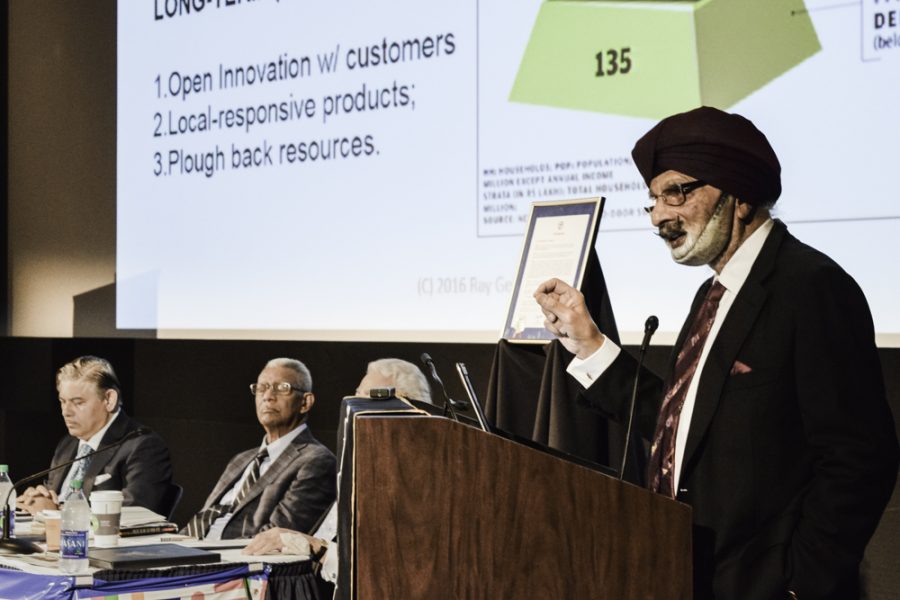What is ‘oneness’?
Ratanjit Sondhe, UA polymer science grad, was the keynote speaker at the Global Oneness event yesterday.
October 4, 2016
One may be surprised that such an abstract concept as “oneness” can have such practical effects on one’s life, both personal and professional.
That is the concept which four distinguished speakers came to discuss in the Student Union Theatre last night, an event put on by UA’s Student 2 Student Global Exchange as part of Global Peace Week and in memory of the 147th anniversary of Mahatma Gandhi’s birth.
The keynote speaker was Ratanjit Sondhe, who graduated from UA in the early 70s with a doctoral degree in polymer science. After introductions by Student 2 Student’s faculty adviser Ray Gehani, Sondhe told of his experience starting a materials business with no experience, struggling to make it grow, and finally finding the key to his troubles in oneness.
According to Sondhe, oneness is the idea that “my prosperity, my happiness, depend on your prosperity, your happiness.”
He said the change came when, his business almost at the point of bankruptcy, he saw a quotation from Albert Einstein which inspired him. It was about how we always think of ourselves as separate from and outside the world in which we live, when in reality we are deeply interconnected with all things, living and non-living.
“Some elements in you might be present in me,” Sondhe said, explaining that – literally – our idea of being separate from other people is an illusion which through compassion can be righted by understanding oneness.
At that point, he started hiring more young people and in the process revamped his business in four ways: there were no more job descriptions, there were no more job titles, employees could not have their diplomas near them in their offices, and the new workers had to get experience in every department before finding the one that most suited them.
His changes worked. In 2007, the DOW Chemical Company bought Sondhe’s business in an “offer that could not be refused.”
Sondhe attributes his “entire success” to his understanding of oneness, which he says is the power that, like the light of which all light bulbs when they are turned on share, is the light of every human being’s life – the power that enlivens the human, from which all other humans are enlivened too. That they come from the same source is what makes all humans fundamentally the same, Sondhe says.
Here are some further ideas which Sondhe outlined in last night’s presentation, and that students who could not attend may find interesting. All stress, he says, comes from having the wrong expectations of others. One’s true purpose, he says, is to add the highest value one can to the world, which comes from contemplating oneness. Data gathered by the senses are incomplete, and are further corrupted by human emotion and misunderstanding – the key is to make your brain a servant to the “you,” which is the part of you that shares in oneness with all other things.
The other panelists included Sudarshan Sathe, who got a master’s in chemical engineering and an MBA from UA. Sathe spoke about the enormity of Gandhi’s struggle against Great Britain in the first half of the 20th century, and and how his understanding of oneness, which led to his commitments to non-violence among other beliefs, gave him the power to endure his work to completion.
Otis Moss, an influential African-American pastor who has numerous personal ties to Martin Luther King Jr., was the third speaker. He iterated many lessons of the latter, and made connections between his and Gandhi’s causes.
The fourth and last speaker was George Frasier, CEO of FraserNet Inc., which is an international networking company. He talked about how personal relationships are one of the most important things in life, how they will provide success in whatever one chooses to do, and how, this being the case, “oneness” has great practical as well as spiritual effects.
“I like the whole idea of ‘you can’t do it all by yourself,’” said Jared Edens, a senior marketing student who attended last night’s event. “I think that’s important for some students at Akron who think they have all the answers, when in fact, the people all around them can really help them out.”
Junior supply chain student Sofie Matheny came to the event for extra credit, but says she enjoyed it nonetheless.
Used to the more “tactical speaking events” put on by UA’s college of business, Matheny liked that this event was “more on the spiritual side.”
More information on UA’s Student 2 Student Global Exchange group can be found here: goo.gl/aNQXg1.












